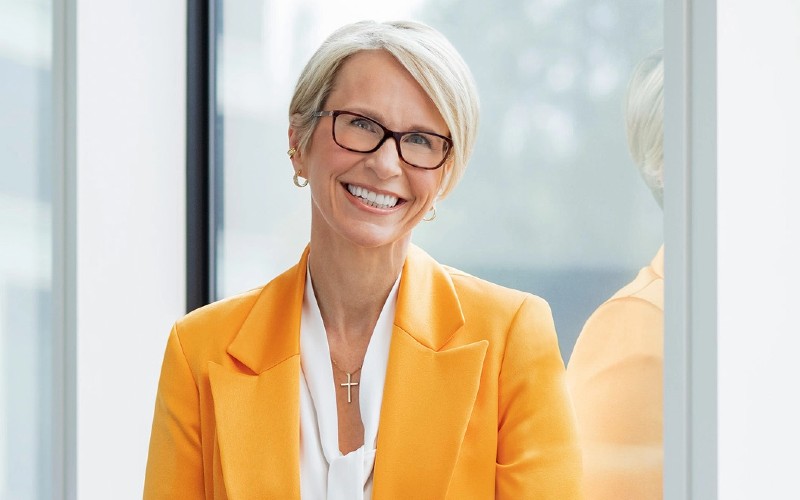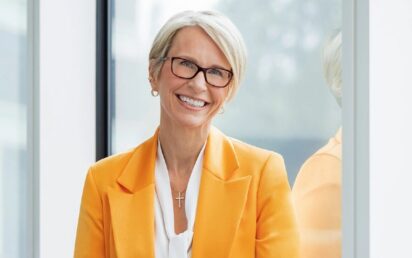Pharmaceutical giant GSK’s chief commercial officer, Luke Miels, will become CEO in January 2026, succeeding Dame Emma Walmsley after nearly a decade in charge.
Walmsley, who became the first woman to lead a major global pharmaceutical company upon her appointment in 2017, has delivered what the business has described as a ‘comprehensive step-change’ in performance, prioritising specialty medicines and vaccines, and bringing multiple new products to market.
Research and development has been overhauled, with 15 major pipeline opportunities set to launch between 2025 and 2031.
At the same time, the balance sheet has been strengthened and Haleon, a new consumer healthcare company, was created through a demerger.
The firm said it is performing to a ‘new standard’ and expects more than £40 billion in total sales by 2031.
“2026 is a pivotal year for GSK to define its path for the decade ahead, and I believe the right moment for new leadership,” said Walmsley.
“As CEO, you hope to leave the company you love stronger than you found it and prepare for seamless succession.
“I’m proud to have done both – and to have created Haleon, a new world-leader in consumer health.
“Today, GSK is a biopharma innovator, with far stronger momentum and prospects than nine years ago. Most importantly, the inspiring people in our labs, factories, and markets worldwide are delivering innovation that matters to get ahead of disease.
“I know Luke will lead them brilliantly to even greater impact for patients.”
Firm linked to Michelle Mone loses £122m PPE case to Government
Her departure, however, has sparked wider debate about the lack of women in top corporate roles.
Debbie Wosskow OBE, co-chair of the UK’s Invest in Women Taskforce, warned that Walmsley’s exit leaves just seven female CEOs across the FTSE 100.
“And then there were 7. This weekend, Emma Walmsley stepped down as CEO of GSK,” she wrote on LinkedIn.
“Women now hold just 7 CEO roles across the FTSE 100. That’s just 7%.
“The UK has slipped backwards in recent years, with even fewer women at the top than before. This is an extremely concerning trend because it defies logic.
“Companies with more diverse leadership teams consistently deliver stronger returns and better long-term performance.
“Yet women remain under-represented in CEO and chair positions. We need more women stepping into these roles and more boards and investors backing them.
“Not as a DE&I initiative, but because it’s good business, good governance, and essential for growth.
“Until then, every high-profile exit like this one is a reminder: the pipeline is too thin, and the system needs to change.”
The latest FTSE Women Leaders Review 2025, published in February, showed that while women held 44.7% of board seats in the FTSE 100 and 43.4% across the FTSE 350 in 2024, the proportion of female CEOs had fallen to just 19 across the FTSE 350, down from 20 a year earlier.
However, the number of women holding executive positions across the FTSE 250 fell from 47 in 2022 to 42 in 2024 – a decline of 11%.
An ‘executive gender paradox’ across these boards has emerged, with the gap between the number of women in non-executive roles and executive roles widening.
In response to Wosskow, Sandhya Sabapathy, CEO and founder of Kaleidoscope, wrote: “It’s because these roles are still not designed to fit women, I have seen time and time again great women refusing to take senior roles as it takes a huge toll on their wider well-being.
“Empathy driven leadership doesn’t come for free. I used to work in a FTSE100 company with a female CEO when she took the reins there was a marked shift in the company in the positive direction.
“There is plenty of proof that women make extremely successful leaders, but these roles are still not designed to support them holistically.”
Gifty Enright, CEO of BUSINESSSCOPE, added: “Seven out of 100? That’s not progress, it’s a polite regression in a power suit.
“We know diverse leadership isn’t just a moral win, it’s a strategic one. But the boardroom still seems to prefer its leaders in one shade and one shape.
“Until the pipeline becomes a firehose, we’ll keep watching talent leak out the sides. Time to redesign the whole damn system, not just patch it up.”
Miels joined GSK in 2017 and is currently chief commercial officer with global responsibility for medicines and vaccines.
Throughout his tenure, he has played a key role in building the company’s specialty medicines portfolio, particularly in oncology and respiratory.
He holds three decades of experience in the industry and, prior to joining the London-based MedTech, spent three years as executive vice president of fellow FTSE 100 constituent AstraZeneca.
Miels added: “I am deeply honoured to be appointed as the next CEO of GSK, and grateful to all the people who have supported me on this journey, especially Emma.
“GSK is a very special company, with outstanding prospects and enormous capacity to impact people’s health and to change lives.
“As the next CEO, I am privileged to take on this responsibility, with humility and ambition.”
Since the announcement on Monday, the company has seen its share price rise 11% to 1654.5p. It has a market cap of £67.2bn.


